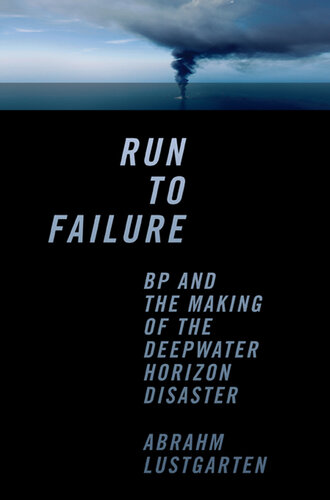
Run to Failure
BP and the Making of the Deepwater Horizon Disaster
کتاب های مرتبط
- اطلاعات
- نقد و بررسی
- دیدگاه کاربران
نقد و بررسی

December 19, 2011
The April 2010 explosion that sank the Deepwater Horizon drilling rig and released millions of gallons of crude oil into the Gulf of Mexico was a catastrophic accident, but no anomaly, according to ProPublica reporter Lustgarten’s investigation. Indeed, it was all too predictable given the track record and management culture of Deepwater’s operator, British Petroleum. Echoing the government’s own finding, but belying the Obama administration’s about-face with respect to Gulf drilling and the expansion of drilling in Alaska, Lustgarten’s account makes clear that the disaster emerged from a business culture driven by Wall Street and a younger management class’s obsession with shareholder profits. The deadly 2005 explosion at BP’s Texas City Refinery and a 2006 Alaska spill arise amid a policy of drastic budget cutting under the leadership of John Browne and Tony Hayward. Lustgarten can be inconsistent in casting BP as a bad apple in the oil industry, while invoking a corporate ethos that makes self-policing impossible, but this often breathless account is a wakeup call, and affords a timely consideration of the nature of international business and its relationship to government. Agent: P.J. Mark, Janklow & Nesbit.

March 1, 2012
The Deepwater Horizon tragedy wasn't an accident after all, but the logical result of a long pattern of incompetence and corruption. So charges ProPublica environmental reporter Lustgarten (China's Great Train: Beijing's Drive West and the Campaign to Remake Tibet, 2008), who's been on the case since long before the deep-sea rig blew up off the coast of Louisiana. Readers may remember that BP, the company responsible for the rig--though other companies, including Halliburton, had a role, too--protested that it had a disaster plan in place for just such occasions; they may also recall that the plan "called for the protection of walruses," which do not live in the Gulf of Mexico. That slip is symptomatic, by Lustgarten's account: BP staffers cut and pasted bits and pieces of the plan "from a website describing conditions halfway around the world." Walruses do, of course, live in the chilly waters of the Arctic, and much of the author's account is set there, following BP's adventures and misadventures on the North Slope. Lustgarten then reverses to the 1970s, when British Petroleum was on the hunt for safe--read, English-speaking--territory in the wake of the OPEC oil embargo, "places with the lowest possible additional risk"--i.e., without the danger of terrorism, the whims of sheiks or commissars and other political externalities. All the riches of Alaska (and, later, the Gulf of Mexico) were paltry compared to the wealth of Saudi Arabia, and to get at them required risk and technological innovation. BP was plenty strong on the risk part, so much so that the EPA had staffers doing nothing but tracking the violations, and that plenty of whistle-blowers were sounding alarms about shortcuts, leaks and accidents waiting to happen from within the company itself. Lustgarten writes with immediacy and urgency, peppering his pages with plenty of human-interest anecdotes and characters on both sides of the story. In the end, though, the story has a depressing inevitability. Readers may justifiably conclude that the Deepwater Horizon tragedy happened mostly because a bad company with an arrogant management was at the wheel. Solid investigative reporting and a worthy addition to earlier books on the immediate effects of the disaster.
COPYRIGHT(2012) Kirkus Reviews, ALL RIGHTS RESERVED.

October 15, 2011
British Petroleum fired employees, allowed the improper disposal of toxic chemicals, and failed to maintain equipment, resulting in a corporate turnaround--and repeated deadly accidents that led to the Deepwater disaster. ProPublica reporter Lustgarten's evidence echoes findings in a report released September 14 by the U.S. Department of the Interior's Bureau of Ocean Energy Management, Regulation and Enforcement. Especially interesting in light of that report.
Copyright 2011 Library Journal, LLC Used with permission.

March 1, 2012
In April 2010, BP's Deepwater Horizon oil rig exploded, spewing millions of gallons of oil into the Gulf of Mexico, and it was news to most of the world. But for a long list of government officials, former BP employees, and even executives of other oil companies, it was a disaster long in the making. Lustgarten, a reporter who has long covered the energy industry, details BP's history of risk-taking that had resulted in hundreds of millions of dollars in fines and federal crimes against the environment and still didn't prevent it from pushing aging infrastructure to the breaking point. He begins with the history of BP and the oil business, including OPEC actions to evict foreign oil companies from the Middle East and the resulting fierce spike in competitive pressures. BP's response was to push equipment and personnel to the utmost as it searched for new oil reserves and methods of extracting oil in more challenging terrain. Drawing on interviews and exclusive access to internal BP documents, Lustgarten offers a compelling tale of corporate greed at the expense of the environment.(Reprinted with permission of Booklist, copyright 2012, American Library Association.)

























دیدگاه کاربران